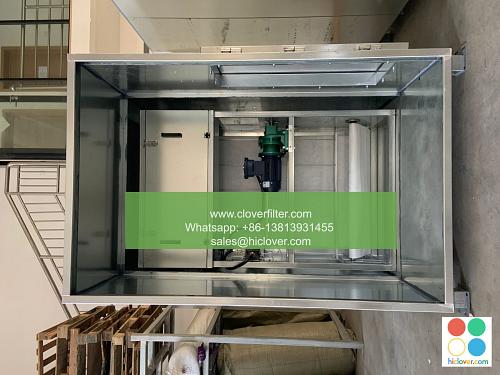The Importance of Automatic Roll Air Filters in Newfoundland’s Offshore Oil Operations

Newfoundland’s offshore oil operations are a crucial part of the province’s economy, providing thousands of jobs and generating significant revenue. However, these operations also come with unique challenges, particularly when it comes to maintaining equipment and ensuring the health and safety of workers. One key component in addressing these challenges is the use of automatic roll air filters. These filters play a vital role in removing contaminants and pollutants from the air, which is essential for both equipment maintenance and worker health.
The offshore oil and gas industry is inherently harsh, with operations often taking place in remote, rugged environments. The equipment used in these operations is subject to extreme temperatures, high humidity, and exposure to saltwater and other corrosive substances. This can lead to rapid deterioration of equipment and machinery, resulting in costly repairs and downtime. Automatic roll air filters help mitigate this issue by removing particles and contaminants from the air that can damage equipment. By doing so, they help extend the lifespan of machinery, reduce maintenance costs, and minimize downtime.
-worker health and safety is another critical concern in offshore oil operations. The air in these environments can be filled with harmful particles and gases, including hydrocarbons, particulate matter, and other pollutants. Prolonged exposure to these substances can lead to serious health problems, including respiratory diseases and cancer. Automatic roll air filters are designed to capture these pollutants, providing a cleaner, healthier environment for workers. This not only improves worker well-being but also helps reduce the risk of workplace accidents and errors that can occur when workers are not feeling their best.
In addition to their practical benefits, automatic roll air filters also play a role in helping offshore oil operations comply with regulatory requirements. The oil and gas industry is subject to strict environmental and health regulations, and the use of these filters can help operations meet these standards. By removing pollutants and contaminants from the air, automatic roll air filters can help reduce emissions and minimize the environmental impact of offshore operations. This is particularly important in sensitive ecosystems like those found off the coast of Newfoundland, where the health of marine life and the environment is a major concern.
Despite their importance, automatic roll air filters are not without their challenges. One of the main issues is the need for regular maintenance and replacement. These filters can become clogged and less effective over time, which can lead to a decrease in air quality and equipment performance. To address this, operators must ensure that filters are regularly inspected, cleaned, and replaced as needed. This can be a time-consuming and costly process, particularly in remote offshore environments where access to supplies and maintenance personnel may be limited.
Another challenge is the high upfront cost of automatic roll air filters. While they can provide long-term savings through reduced equipment maintenance and improved worker health, the initial investment can be significant. This can be a barrier for smaller operations or those with limited budgets. However, the benefits of these filters far outweigh the costs, and operators who invest in them are likely to see significant returns over the long term.
In conclusion, automatic roll air filters are a crucial component of Newfoundland’s offshore oil operations. They help maintain equipment, ensure worker health and safety, and support regulatory compliance. While they present some challenges, the benefits they provide make them an essential investment for any operation looking to minimize downtime, reduce costs, and protect the environment. By prioritizing the use of these filters, operators can help ensure the long-term sustainability and success of Newfoundland’s offshore oil industry.
FAQs
- What are automatic roll air filters, and how do they work? Automatic roll air filters are devices that use a rolling mechanism to advance a clean filter media into place, removing particles and contaminants from the air. They are designed to provide a consistent flow of clean air, which is essential for equipment maintenance and worker health.
- Why are automatic roll air filters important in offshore oil operations? Automatic roll air filters are important because they help maintain equipment, ensure worker health and safety, and support regulatory compliance. They remove pollutants and contaminants from the air, which can damage equipment and harm workers, and help minimize downtime and reduce costs.
- What are some challenges associated with using automatic roll air filters? Some challenges associated with using automatic roll air filters include the need for regular maintenance and replacement, as well as the high upfront cost. However, the benefits of these filters far outweigh the costs, and operators who invest in them are likely to see significant returns over the long term.
- How can operators ensure the effective use of automatic roll air filters? Operators can ensure the effective use of automatic roll air filters by regularly inspecting, cleaning, and replacing them as needed. They should also prioritize proper installation, maintenance, and training to ensure that filters are used correctly and efficiently.
- What are some potential consequences of not using automatic roll air filters in offshore oil operations? Some potential consequences of not using automatic roll air filters include equipment damage, worker health problems, and regulatory non-compliance. These can lead to costly repairs, downtime, and legal penalties, which can have significant impacts on operations and the environment.

